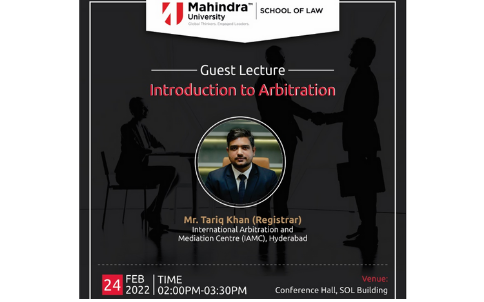Mr. Tariq Khan, Registrar of International Arbitration and Mediation Centre, Hyderabad, advised students of Mahindra School of Law, that Arbitration should be adopted as a priority and litigation could possibly be the way forward as an alternative in resolving private commercial disputes for speedy disposal of issues. As the registrar, Tariq Khan is building the institute of International Arbitration and Mediation Centre at Hyderabad, a prestigious initiative of Chief Justice of India, N V Ramana. Tariq was addressing students and faculty of School of Law, Mahindra University, on 24th February, 2022, for one and half hourson key concepts and practices in arbitration in both the Indian and international contexts and interacted with students and faculty. Mr. Vivek N.D., who organized the lecture, welcomed and set the agenda for the discussion.
Tariq Khan took the participants through the processes which arbitrators must follow to arrive at an amicable solution between disputing parties. He emphasised the need to understand the commercial interests of the parties as well as the larger frame in which the dispute has arisen. Clarifying the process of arbitration, he pointed out as a private dispute resolution process and an alternate form of dispute resolution Arbitration is conducted away from the undue scrutiny of the public, which happens in general litigation. Arbitration is a consensual process where the parties submit their disputes for resolution to an arbitral tribunal that is usually comprised of one or three arbitrators.
A young legal professional, Tariq Khan has been a practicing advocate in the Delhi High Court for more than seven years with significant experience in domestic and international arbitrations, commercial disputes, writs, MSME disputes, insolvency andbankruptcy cases. He has been listed in the Forbes Legal Power list, 2020-2021 as one of the top individual lawyers below ten years of practice and was the youngest lawyer listed in BW (Business World) Legal 40 under 40, 2020. He has been recognized as an arbitration expert by SCC Online and has more than 50 publications to his credit.
The arbitral process allows disputants the freedom to appoint their own preferred arbitrators and engage their own counsels, as well as decide the procedure and rules for the arbitration.Explaining the benefits of arbitration Tariq highlighted speed, efficacy and capacity of arbitrators to bring opposing parties to a solution in less time, besides being cost efficient.
In the first half of his lecture, Tariq Khan exhorted students to engage actively in academic pratices which would hold them in good stead through their careers as arbitrators, mediators and legal professionals. Tariq pointed out how it is essential for students of law to practice the following with dedication- reading (especially judgements), writing (focusing on case briefs), mooting (based on one’s own interests, be it arbitration or criminal law) and networking (with scholars and practitioners of law) to make one’s prescence and work more visible. He also pointed out that the competitive nature of the legal profession in current times makes it all the more important to engage in meaningful internships which provide opportunities to learn by pratice and develop key skills to build a career in law.The session ended with a number of questions fielded by the students and faculty with the interaction leading to possibilities for further engagement of the students with the International Arbitration and Mediation Centre, Hyderabad.
Prof Sridhar Acharyulu, Dean, School of Law, Mahindra University explained how the justice could be the speedier destination in alternative dispute resolution process and why the young students of law should develop an inclination to address the issue of resolution of cases without presentingthem to the formal court of law. The Dean felicitated Tariq with a shawl, and presented a book. The students of the 1st year of the integrated BALLB (Hons.) programme- Venkat introduced the guest, Gurupriya compered the programmeand Harish proposed the vote of thanks.





